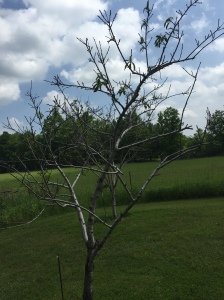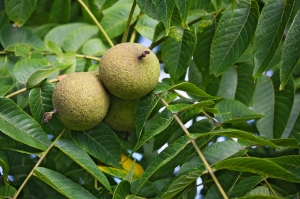A highly valued tree; but at what cost?
When I was a kid, I would always go over to the neighbors yard because they had large trees that we could climb. One of the trees was a black walnut, back then that was all I knew about the tree. I knew it was a walnut tree and that it would drop these big green things and squirrels would hide them for later!
Black Walnut, Juglans nigra, is highly valued for its fine grained dark wood, used often for furniture. It is also a great food source for wildlife. While it may provide beautiful veneer wood it also provides a natural herbicide called juglone. Juglone is found in almost all the tissue parts of a black walnut tree, just in different concentration. The highest concentration can be found in the fruit, the fleshy green layer of the walnut, with 100. Like mentioned, the juglone is a natural herbicide produced by black walnuts so this is where the foe part comes in. It prohibits new growth of certain plants, trees, shrubs, or flowers around it and if it is grown by already established things it can kill them off. I recently went to a site visit where this was the case. The landowner had a hobby farm, where he was growing black walnuts. The trees are doing great however they are now seeing that their plum trees and other surrounding vegetation is dying off. As leaves, fruit, flowers blow off the tree and land on and near other vegetation they secret the toxic juglone. It is also in the roots and trunk so it is leeching into the soil. If the tree is cut down and removed the “herbicide” is still in the soils and can take years for it to be gone depending on the drainage of the soil. Now, its not all bad, like I mentioned great food source for wildlife and humans like walnuts and it is a great wood for production, just have to be selective of whats around it. Some plants are tolerant to the juglone and still can be grown. Some examples of tolerant species include, beans, carrots, corn, black-eyed Susan, morning glory, trillium, Eastern redbud, dogwood, poplar, black raspberry, and soybeans. There are several other species tolerant. Most folks do not like black walnut trees because they are messy but now their minds will be blown- messy and toxic! Because of this if they are not out naturally growing in a forest; they are usually use for plantations for nut production or can be a yard tree with selective vegetation around it.
Side note: black walnuts are not the only tree that produce juglone- other members of the Juglandaceae also produce it as well as hickory trees. Butternut, English walnut, bitternut hickory, pignut hickory, pecan, shagbark hickory, mockernut hickory are the common names of juglone producers!


